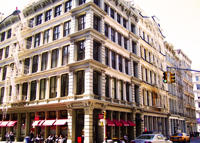In a landmark decision, New York’s highest court last week exempted certain units covered by the Loft Law from rent stabilization. It also applied the ruling to commercial properties where tenants live illegally.
The decision is a major win for loft landlords, who can now buy out tenants in those units and be assured of getting market-rate rents going forward.
The case concerned a loft at 78 Reade Street, a Tribeca property owned by the major landlord Albert Laboz.
Before Laboz bought the building, a tenant in one unit had made improvements to it and become a legal occupant under the Loft Law, which entitled the tenant to a regulated rent. The tenant then negotiated a buyout from the landlord, enabling the owner to charge a market-rate rent.
Laboz did that, raising the rent to $4,200 from $440. By February 2016, the new tenant, Raffaello Locatelli, was on a month-to-month lease. Laboz then issued Locatelli a notice to vacate by the end of April.
The tenant stayed, and Laboz filed a holdover proceeding. But Locatelli played his trump card, arguing that a 2009 court decision, Acevedo v Piano Bldg, meant his unit was subject to rent stabilization — which includes eviction protection — even though a previous tenant had sold the occupancy rights to the landlord.
Laboz countered that the Acevedo decision was “not good law” and if the courts did not enforce it, the premises was not subject to rent stabilization.
Read more


Laboz’s attorney, Joseph Goldsmith, said the Acevedo case had been “devastating” to landlords who laid out significant amounts of money to buy out Loft Law tenants only to be forced to roll back the rents.
A Civil Court judge dismissed Laboz’s holdover action, ruling that Locatelli’s unit was subject to stabilization. The Appellate Division affirmed that decision, Goldsmith said. Rarely are Appellate rulings overturned, but on Feb. 15, the Court of Appeals reversed it.
“After entering the impenetrable thicket” that is rent regulation, Judge Michael Garcia wrote, the majority decided that because a purchase of rights had removed the unit from rent regulation under the Loft Law, the unit is not subject to rent stabilization or the eviction protection it affords.
That gives Laboz the green light to evict Locatelli.
“The importance [of this decision] cannot be overstated,” Goldsmith said. “Once you go through the process in the Loft Law to deregulate a unit, you don’t have to worry about rent stabilization.”
Not only does the opinion remove uncertainty for owners around loft tenancy buyouts, Goldsmith said, but it benefits tenants who can reap windfalls from those buyouts.
Before the Acevedo decision in 2009, tenants, who may have spent large sums renovating their lofts into legal, attractive apartments, had considered the work a long-term investment, “almost like a retirement plan or annuity,” Goldsmith said.
Their occupancy rights were valuable because owners who bought them could remove the unit from rent stabilization. But Acevedo killed their leverage by keeping their units in rent stabilization for future tenants.
“All of those tenants overnight lost that retirement plan they thought they had,” Goldsmith said.
The Court of Appeals’ decision last week gives tenants back that bargaining power.
“They have something of value again that one day they could sell because the owner will be able to reap the benefit [of destabilization] if they pay the tenants for it,” Goldsmith said.
Rent stabilization advocates, it should be noted, are not fans of buyouts. They prefer that units remain rent-regulated forever, so landlords are not incentivized to get tenants out of their apartments. Most avenues for removing non-loft units from rent stabilization were closed by the legislature in 2019.
Commercial units stand to benefit from a section of last week’s ruling that covers illegally occupied commercial buildings not covered under the Loft Law. Those units, the court ruled, are also not subject to rent stabilization.
Previously, Goldsmith said, owners of offices or factories where tenants lived illegally faced the risk that those renters would demand rent stabilization, compelling the owner to spend millions of dollars to legalize the units as loft residences.
“They don’t have to worry about that anymore,” the attorney said.
